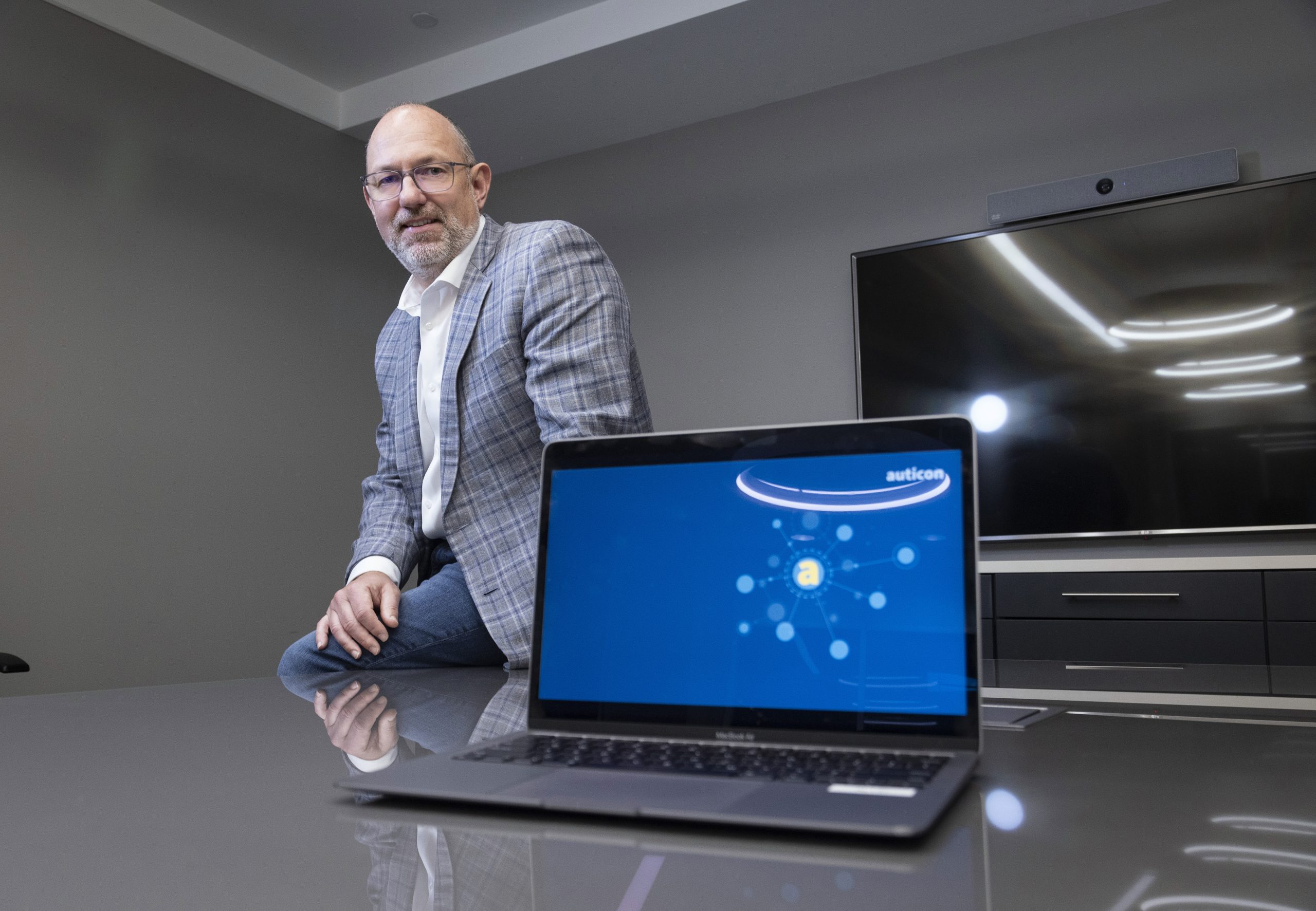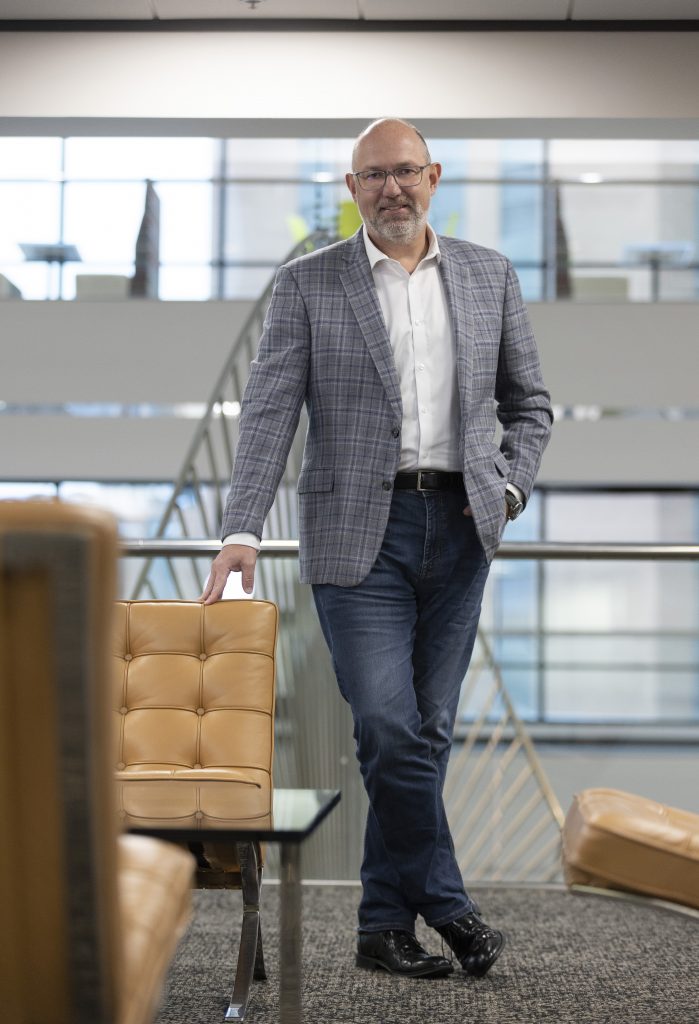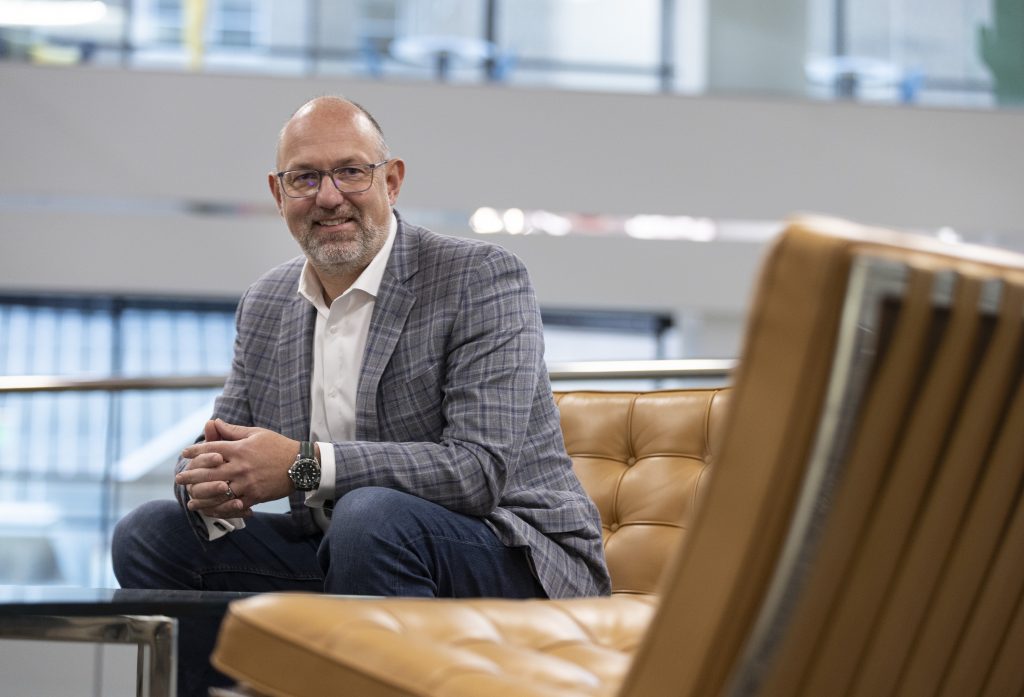Finding a Fit
A Neeley alum matches workers on the autism spectrum to high-tech careers.

David Aspinall, CEO of auticon US, earned an executive MBA from the Neeley School of Business after his career brought him to Texas. Photo by Ralph Lauer
Finding a Fit
A Neeley alum matches workers on the autism spectrum to high-tech careers.
As the CEO of a leading employer of tech workers on the autism spectrum, David Aspinall MBA ’18 offers a brighter, more meaningful future for its nationwide neurodiverse workforce. While on the auticon payroll, these workers are placed at companies such as Disney, ESPN, Nationwide Insurance and Fidelity Investments to perform a range of technology-related jobs.
“This is not a charitable endeavor, but we do have a social mission,” said Aspinall, who began leading auticon US just as the Covid-19 pandemic hit North Texas in March 2020.
“We use the principles of business to provide high-quality technology careers to autistic adults, 85 percent of whom are either unemployed or underemployed,” he said.
Armed with an executive MBA from TCU’s Neeley School of Business, Aspinall runs the U.S. business for auticon. Since its founding in Germany in 2011, auticon has placed more than 500 neurodiverse people in positions in software development, data analysis, engineering and other tech professions around the world.
HELPING WHERE NEEDED
The term “neurodiversity” refers to differences in brain function and is most frequently used in the context of those on the autism spectrum.
“When people join us, they have been unemployed on average for 14 months, which is amazing because we’re talking about people who can do an in-demand job,” Aspinall said. “Huge numbers of people who have come to us previously worked in fast food, even though they might be amazing software developers.”

At auticon US, David Aspinall leads a company that helps place workers on the autism spectrum into jobs in the tech industry. Photo by Ralph Lauer
The process starts when auticon hires an employee through a recruitment process that’s friendly to those on the spectrum, which often means moving away from a formal interview. “We don’t even use the word ‘interview,’ which we’ve realized can be such a cause of anxiety to our individuals,” Aspinall said. Instead, auticon’s hiring team gamifies the hiring process “so we can better understand the cognitive strength of the individual.”
Employment through auticon gives workers high-quality health insurance and 401(k) plans. The company also provides ongoing job coaching as well as project management support to help ensure their success in the workplace.
Outside employers contract with auticon to place the company’s tech workers on their teams. Recently, auticon also began consulting with employers on how best to manage members of a neurodiverse workforce that might also include people with ADHD, dysgraphia and dyslexia.
“We now help companies assess how they are doing on recruitment, accommodations, policies and communication, then give them pathways on how they can fix any problems or next steps,” Aspinall said.
Tweaks to office routines can yield big dividends when it comes to worker satisfaction, productivity and fit. Aspinall described one team member with autism who struggled during a company’s daily stand-up meetings.
“He thought these were meetings for everybody to understand what he was doing rather than him being part of a team,” Aspinall said.
After identifying the issue, an auticon job coach asked the team leaders to put out a written agenda so that the tech worker could read the objectives of the meeting before the group gathered.
“A lot of the advice that our job coaches give is actually just good business, like clear communication, not making assumptions and backing up verbal instructions with written instructions,” he said.
ROAD TO AUTICON
Aspinall’s path to becoming a CEO started in Manchester, England. The son of an electrical engineer and a stay-at-home mother, he graduated from the University of Sheffield, then moved to London to work as a bid manager for Atos, a global tech firm.
Verizon brought him stateside in 1999 to work as a sales director in Chicago, where he met his wife, Laura Yesley. Aspinall jumped to AT&T in 2004.
During his 11 years with the company, he and his family moved to Maryland and then to Toronto when he became president of AT&T’s Canadian operations. Relocating to Dallas-Fort Worth, home of AT&T’s headquarters, was already on his radar when Sprint Business tapped him as region president.
Aspinall had long excelled at identifying talent and building a positive business culture for the people he managed. What he craved was a formal business education at a U.S. university. During his time at Sprint, he enrolled in TCU’s executive MBA program, earning his degree in a year and a half. Two-week stints in Greece, Dubai and India rounded out what he described as an exceptional experience.
“It was in the entrepreneurship class where I first heard the term ‘intrapreneur,’ which is somebody that has an entrepreneurial approach to business but is operating within a bigger company,” he said. “A light bulb went off.”
“In that course it was clear to see David’s leadership abilities and his talents,” said Ray Smilor, emeritus professor of professional practice in management, entrepreneurship and leadership at Neeley. “Part of what the TCU EMBA does is take a very personal approach to each student in the class to help them identify something personally, powerfully and emotionally important to them.
“We would talk about creativity and innovation and thinking entrepreneurially,” Smilor said, “which gets people like David excited.”

David Aspinall’s ties to TCU go beyond his MBA. His wife, Laura Yesley, became executive program development director at the Neeley School of Business in June 2023. Photo by Ralph Lauer
In June 2023, Yesley became executive program development director at the Neeley School of Business, which only strengthened her husband’s ties to the school. The couple live in Fort Worth with their teenagers, Tom and Olivia.
While working toward his MBA, Aspinall became a member of the Young Presidents’ Organization, which he also credits for much of his success. The group, with more than 34,000 members, is the largest worldwide community of CEOs and other top business professionals.
“Through YPO, which I never would have joined if I hadn’t gone to TCU, I got to understand the world of private equity,” Aspinall said, “and I got to understand that there were groups of investors investing in companies that had problems I could help solve.”
As an MBA student, he founded a boutique consulting agency called Sales Enablement Partners that worked with clients like Luther King Capital Management and Satori Capital primarily on sales and marketing. The year he graduated from Neeley, Sales Benchmark Index acquired his consulting agency, where he stayed on as managing director until auticon US recruited him.
“At auticon, David’s passion and purpose came together,” Smilor said.
“He excels at proving the business case, that it’s an advantage to hire our team of technologists on the autism spectrum,” said Ivette Marina, chief operating officer of auticon US. “For many autistic individuals, social things like making eye contact during a job interview can be challenging and barriers to employment.”
DIVERSITY FIRST
Aspinall built a diverse U.S. leadership team, half of whom are women.
“One of his biggest contributions is believing in his team and really seeing how to match everybody up to their strengths,” Marina said. “His confidence in our business model and his belief in our team made a huge difference to our existing clients and also to bringing new clients on board.”
“We see this as a win-win-win for autistic professionals, companies and society.”
David Aspinall
The wider business community has taken notice. The Dallas Business Journal honored him with its 2023 Leader in Diversity award. A few months later, the San Fernando Valley Business Journal honored him as CEO of the Year as part of its diversity, equity and inclusion awards.
Aspinall said that tech workers on the spectrum bring unique attributes to the workplace. Many are adept at spotting patterns in large amounts of data.
“They also often look at a problem in a different way, which is appealing to employers,” he said.
Aspinall hopes to continue growing the business as rates of autism in the U.S. have hit an all-time high. The Centers for Disease Control and Prevention reported in March 2023 that 1 in 36 American children have been diagnosed with autism, a 178 percent increase since 2000.
“The demand for this work is overwhelming, which only adds urgency to what we do,” Aspinall said. “We see this as a win-win-win for autistic professionals, companies and society.”

Your comments are welcome
Comments
Related reading:
Alumni, Features
How It’s Going
Former TCU football player Jaden Oberkrom found a passion in training future kickers.
Features
Weighing the Benefits
Look beyond the base salary to determine a job offer’s value.
Alumni, Features
The Soprano
Opera singer Vanessa Becerra hits a career high note.